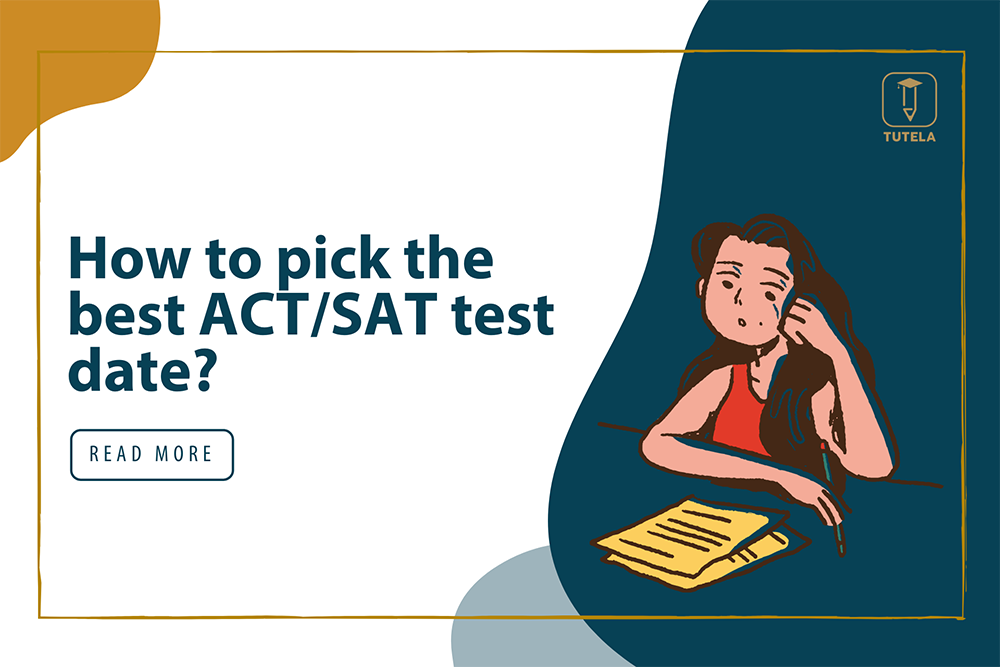
We have often come across students struggling to find the best ACT/SAT dates to ensure the maximum test prep time and good scores. We are breaking down a few crucial factors to be kept in mind while deciding the best test dates.
1. Number of ACT/SAT attempts you plan to take
- The ideal recommendation for the number of attempts for ACT/SAT ranges from two to three times in total.
- Since the juniors have plenty of time before college applications, they can take their ACT/SAT on any test date that works for them. They can also arrange their attempts in this order: FIRST in the fall of junior year; SECOND in the spring of junior year; THIRD in the summer or fall of the senior year.
2. Study time needed
- We usually recommend studying for at least three to six months before students take the actual ACT/SAT. But before that, students should figure out how much time they must study to reach their target score- the ACT/SAT score they need to get into the colleges they are applying to.
- Once the student has the goal score, it is time to find the baseline score. This is the score students start with before they begin any test prep.
- Students can find their baseline score by taking an official ACT/SAT practice test. Students should make sure to mimic the actual testing conditions and follow strict time limits. Once they finish, they can score their test to get their baseline. Then students should subtract the baseline score from their goal scores to calculate how many points they need to improve.
- Students can also refer to the conversions below to see how many approximate hours they will need to study to hit the goal score on test day.
SAT
- 0-30 point improvement: 10 hours
- 30-70 point improvement: 20 hours
- 70-130 point improvement: 40 hours
- 130-200 point improvement: 80 hours
- 200-330 point improvement: 150 hours+
ACT
- 0-1 ACT point improvement: 10 hours
- 1-2 ACT point improvement: 20 hours
- 2-4 ACT point improvement: 40 hours
- 4-6 ACT point improvement: 80 hours
- 6-9 ACT point improvement: 150 hours+
- The more significant the point improvement they need to make, the more hours they will study.
- In general, students can devote 10 hours per week to the preparations.
3. College Application deadlines
- In case a student is in their senior year, he/she will need to pay careful attention to the upcoming college application deadlines to ensure their scores get to the schools in time.
- Most college application deadlines will be in the fall or early winter of the senior year. The most common application deadline is January 1. But if students are applying for early action or early decision, they could have deadlines in early November, possibly October.
- At the same time, some schools have much later than standard deadlines that fall in February and March. Therefore, these schools will guarantee the most flexibility in terms of when to take the ACT/SAT as a senior.
4. SAT/ACT Scholarship deadlines
- If students are applying for any scholarships that require the ACT/SAT scores, students should make sure the test date(s) they pick will definitely get their scores to the school in time.
- These scholarship deadlines will likely be the same as the college application deadlines, but students should always check ahead of time just in case they are different!
5. Other important exams: AP Exams & IB Tests
- Students should not pick an ACT/SAT test date that is on or right around another important test, such as an AP test, IB test, midterm, or final.
- Doing this can overwhelm the student, and they will have less time to study for two different tests simultaneously. So, students must think hard about their current test schedule before considering specific ACT/SAT dates.
- Although it is not impossible to take the ACT/SAT around the same time as students have another test, the only way they are likely to do well in all of them is to commit themselves to find time to study and organize the prep schedules.
6. Extracurriculars and Personal Commitments
- The final factor is to be AWARE of the obligations and extracurriculars. These commitments could be an internship, a volunteer position, a sport, a club or society a student is a part of, an event student is helping out with, or a family vacation trip.
- Students must make sure not to schedule any ACT/SAT test dates around these times. Students can keep track of the schedule by writing down upcoming events and commitments on a calendar or planner. Recommended Article: ACT/SAT scores and scholarships
Choosing from so many ACT/SAT dates can be tricky because there are numerous factors involved. But remember that even if you do not get the score you want, you can always retake the ACT or SAT and give it another shot!
In case you are having problems planning your test timeline, let us guide you.
